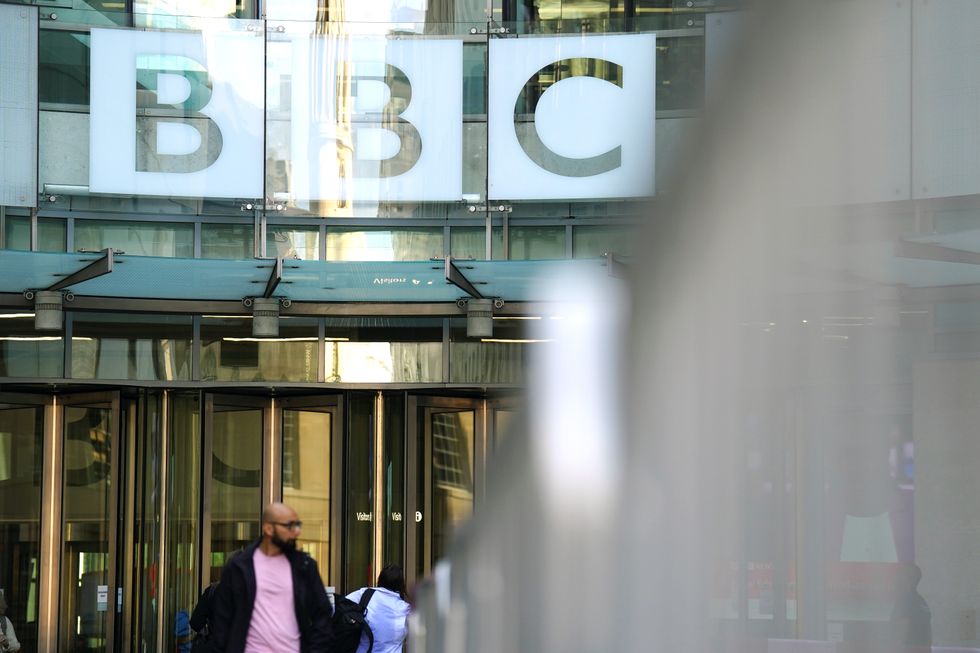BBC iPlayer saw a 10% increase in the number of streams compared with 2023, despite a drop in the total number of TV licence fee payers across the UK
GETTY IMAGES

All products and promotions are independently selected by our experts. To help us provide free impartial advice, we will earn an affiliate commission if you buy something. Click here to learn more
Annual Report shows strong viewership for BBC iPlayer when compared to Netflix, Disney+, and others
- UK adults spent more time watching BBC content than Netflix
- Weekly figures show BBC topples all streaming services combined
- Netflix starts from £4.99 a month, compared to £14.12 for TV licence fee
- Streams on BBC iPlayer enjoyed a 10% boost year-on-year
- Despite this, half a million households cancelled licence fee last year
- Broadcaster still needs to find £200 million in savings
Don't Miss
Most Read
Trending on GB News
Despite boasting a string of hit shows — like Bridgerton, Stranger Things, and Emily In Paris — Netflix still can't compete with the BBC.
New figures published in the BBC's Annual Report, which also confirmed that Match of the Day host and podcast entrepreneur Gary Lineker remains the BBC's top earner with a £1.35m salary, show that audiences spent an average of 5 hours 44 minutes watching BBC shows across live channels or iPlayer each week.
That's more than every streaming service combined. On average, Netflix viewers watch 2 hours 22 minutes each week, data from industry records keeper Barb shows.

Netflix has revealed the most-watched shows of 2023 worldwide, including One Piece, Dear Child, Who Is Erin Carter?, Lupin: Part 3, The Witcher, Sex Education, Beckham, The Lincoln Lawyer, and Painkiller, amongst others
NETFLIX PRESS OFFICEFaced with fierce competition from an upgraded ITVX streaming service, new plans from Channel 4 to prioritise streaming over everything else, and affordable new ad-supported plans from Disney+ and Netflix starting from just £4.99 — compared to a monthly cost of £14.12 for the TV licence fee, viewing figures for BBC iPlayer increased 10% year-on-year, the latest figures show.
That equates to a record 8.1 billion streaming requests from the streamer, which is available on Smart TVs, Freely, iPhone, Android, and dozens more devices. Given that activity on iPlayer saw such a large increase, despite felling numbers of TV licence fee payers, it suggests that more people are moving away from traditional broadcasts in favour of streaming — something campaigners have warned about.
It comes just a few months after the BBC pulled the ability to watch offline on Windows and Mac computers.

Anyone who watches live programming — whether that's over a traditional broadcast aerial, satellite, or streaming over Wi-Fi — will need to pay for a TV licence. It currently costs £169.50 a year — an increase from £159 in April, a move that was widely criticised at the time
BBCIn comparison, Netflix revealed its most-watched TV show last year was the first season of One Piece, based on the best-selling manga series of the same name, which boasted 71 million views worldwide. It broke previous records for the Californian company set by Tim Burton's Wednesday and Stranger Things.
- View Deal | Start watching Sky Stream + Netflix subscription for £22, was
£29 - View Deal | Get Sky TV + Netflix for £14 for three months with Sky Glass
- View Deal | Save 10% on Netflix, Disney+ and other streamers with Virgin Stream
Other hits for Netflix, which operates in 190 countries across the globe, were Dear Child (52 million), Who Is Erin Carter? (50 million), Lupin: Part 3 (49 million), The Witcher season three (47 million), Sex Education season four (46 million), Beckham (43 million), children's show CocoMelon season eight (37 million), Virgin River season five (35 million), The Lincoln Lawyer season two (35 million), and Painkiller (34 million).
In comparison, 14.6 million people watched The Coronation of King Charles III on the BBC, while 10 million tuned-in to watch the Eurovision Grand Final in Liverpool. In fact, seven of the UK’s 10 most-watched programmes last year were on the BBC.
According to the BBC's Annual Report, its strong performance can be attributed to its content reflecting British lives. While only 16% of UK adults felt that shows on Netflix accurately portrayed the lives of those living in the UK, the figure for BBC shows and iPlayer was four times higher.
The report goes into more depth: "Such global providers are not associated with programmes that reflect the lives of people in the UK – for example, 16% of UK adults feel Netflix shows these, and this is the highest-ranking tracked SVOD service on this measure.
"In comparison, the figure for BBC TV/iPlayer – the highest-ranking tracked provider – is four times higher at 64%. As the largest UK media brand for the young, we want to make sure UK storytelling remains integral to the media diets of the UK public of all ages."
Anyone who watches live programming — whether that's via a traditional aerial, satellite, or streaming over Wi-Fi — will need to pay for a TV licence. It currently costs £169.50 a year — an increase from £159 in April, a move that was widely criticised at the time.
It's a common misconception that you can be sent to prison for licence fee evasion. However, you can be imprisoned for failing to pay the fine for not having a valid TV licence.
Earlier this year, the BBC confirmed to GB News that those watching certain shows on Netflix do need to pay the £169.50 fee.
Despite this, the number of Britons who pay for a BBC TV licence is declining year-on-year, with the broadcaster stating that it's now £1 billion worse off since 2010 and facing “funding pressure”.
According to figures from the latest Annual Report, the BBC has made savings of £323 million so far, with £287 million completed in the last financial year. A further £200 million will need to be cut from budgets and salaries because of the declining number of licence fee payers, the broadcaster confirmed.
With the next General Election not due until 2029, it'll most likely be Keir Starmer's Labour Government that will need to agree on a new BBC charter when it comes up for renewal in late 2027.
Discussing the challenges identified in the 2024 Annual Report from the BBC, Director-General Tim Davie admitted that the decline in licence fee payments has “chipped away” at its income. He said: “Our big challenge now is to accelerate rapidly the transformation of the BBC.
"We need to create a leaner, more agile organisation, and make the most of the digital-first opportunity to redesign our processes, cut costs and serve audiences better. Below inflationary licence fee settlements have chipped away at our income over many years and have put serious pressure on our finances. We now have an inflation-linked agreement until the end of the Charter, but this comes on the back of a 30% cut in real terms between 2010 and 2020, and a tough couple of years of flat funding.”
Chairman Samir Shah said that the licence fee’s increase in April by £10.50 “certainly brought more financial certainty, but the rise was less than anticipated”. It was the first increase since 2021 and was brought in to create a funding shortfall of £90 million.

Tim Davie has spoken-out publicly against switching from a TV licence fee to a Netflix-style subscription model when the next charter comes up for renewal in 2027
PRESS ASSOCIATION
Davie has publicly rejected calls for a subscription model similar to Netflix, as he said it would incentivise the BBC to only produce content for its most die-hard subscribers. Earlier this year, he said: “We should not create another commercial walled garden or a narrow BBC that provides a niche service for the most hardcore users. The very wonder of the BBC is that quality news sits next to genres, such as drama and sport, thus ensuring widespread usage.”
LATEST DEVELOPMENTS
- Is there a Government Edition of Windows 11 with no tracking?
- Fire TV Stick crackdown blocks free Sky TV streams — 'this is just the start'
- Mid-contract broadband price rises OUTLAWED by Ofcom
- Microsoft increases prices for millions on PCs, Fire TV Sticks, or Xbox
- Best VPN deals
- Best Sky Stream deals
Quizzed on whether a subscription model could work on a recent flight to Washington DC, Sir Keir Starmer responded: “We’ve committed in our manifesto to obviously the BBC and to the licensing scheme. It comes up, I think from memory, in 2027 so obviously there’s going to be some more thought between now and then, but we are committed to the BBC and we are committed to the licensing arrangements.”
Richard Sharp, the former BBC chairman, said last year that he was in favour of a mandatory licence fee, although he was worried it was regressive because those on lower incomes pay the same as wealthier households. Discussing the issue last summer, he said: “I would be in favour of a form of a mandatory payment – currently the licence fee. There is one issue, which is that it’s regressive, which may need to be addressed.”







